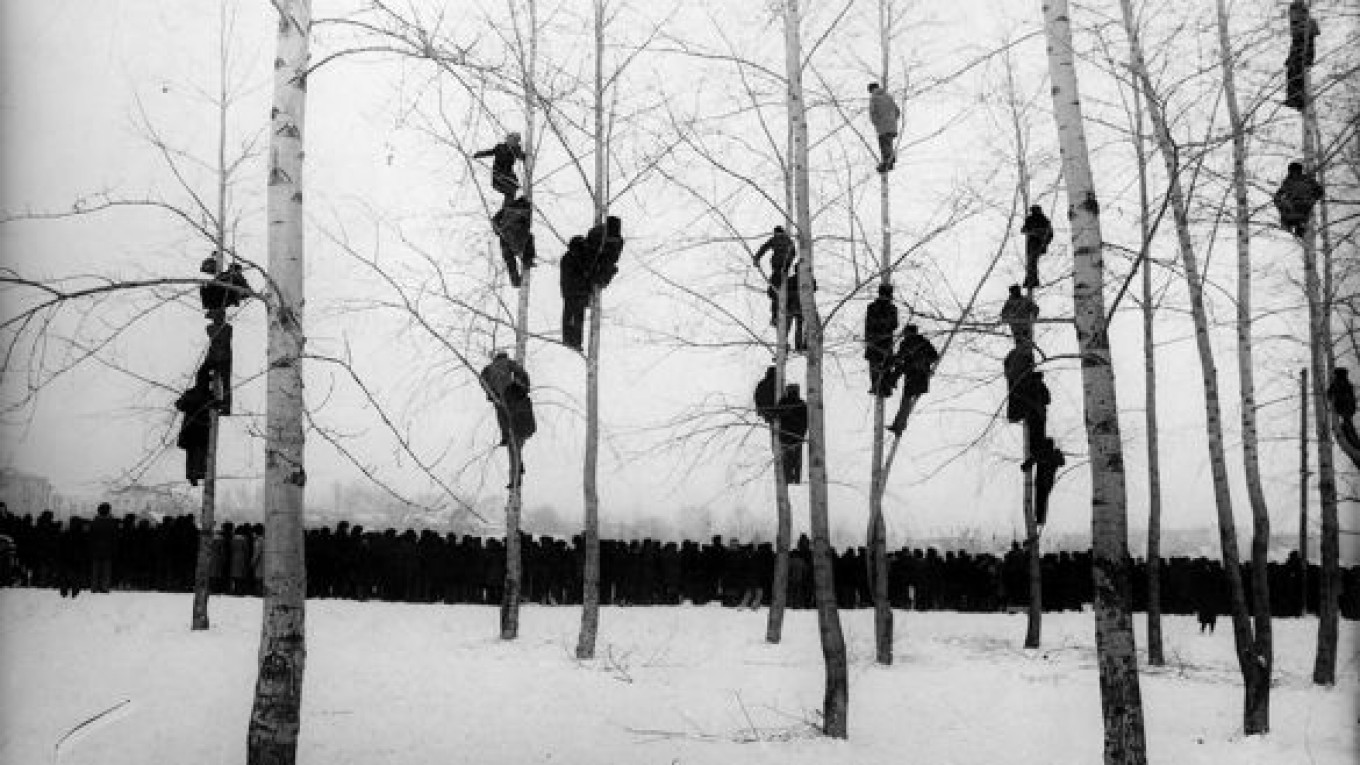HOUSTON, Texas — Sometimes the clearest and broadest view can only be gained from afar.
For the last month, in Houston, Texas, FotoFest, one of the world's largest and most important photography biennials, has celebrated the rich history and diversity of Russian photography.
In an unprecedented and highly ambitious program that spans five decades and exhibits nearly 1,000 works by 146 photographers, "Contemporary Russian Photography 1950s-2012" is the kind of comprehensive exposition that is essential for both a Russian and Western understanding of Russian photography, past and present.
Wendy Watriss and Fred Baldwin, founders of FotoFest, which has served as a model for photo festivals and portfolio reviews around the world since its inception in 1983, have been working with Russian curators and photographers for many years. Recently, they joined forces with Dasha Zhukova, who has promoted contemporary art in Russia through her Garage Center for Contemporary Culture and Iris Foundation.
Together, FotoFest and the Iris Foundation seek to further develop Russia's art photography and a wider audience for it.
"To bring all the best of the world to Russia and to work with Russian artists, curators, critics and to bring them out," Garage's director Anton Belov said of the initiative.
The focus of the shows in Houston is the re-emergence and development of the personal voice, as it found expression within the constraints of Soviet ideology and later in the wildly liberating forces of the '80s and '90s.
To this end, the curators, Irina Chmyreva, Yevgeny Berezner and Natalia Tarasova, divided the show into three sections: After Stalin, the Thaw, the Re-Emergence of the Personal Voice (1950s-1970s); Perestroika, Liberalization and Experimentation (1980s-2010); and The Young Generation (2009-2012). As Chmyreva writes in the catalog, "These exhibitions are the history of the transformation of photography from being the pictogram of ideology to becoming a vehicle for free, creative self-expression."
The heart of the shows lies in the second exhibit, Perestroika, Liberalization and Experimentation, filling two large galleries. Rather than trying to form a grand narrative, the curators, fittingly, focused on individual styles and themes. While officially all artists worked in aesthetic servitude to state propaganda before perestroika, photography was especially discouraged and not really seen as an art form at all.
"During Soviet times, theory of art did not exist because photography was just about ideology. It was a kind of illustration of propaganda text. At the same time it did exist as art, but it was not covered by official art historians. And people who really thought about photography were self-educated," Chmyreva said.
Indeed, many of the photographers featured were self-taught and worked as engineers or teachers by day, busily developing their photos in their bathrooms by night. Some had more exposure to the West through their occupations. Alexander Suvarov, one of Russia's most influential photographers, worked as an interpreter and met filmmakers such as Federico Fellini and Michelangelo Antonioni.
Others used their official state assignments to express themselves. In 1980, Vladimir Shakhlevich was sent to a small village to take passport photographs. The members of the Red Banner kolkhoz, a collective farm in Belarus, had only recently gained freedom of movement, and they posed proudly in their finest clothing for their very first passport photographs.
While the second major exhibit has works of many young photographers, the third show, The Young Generation, is dedicated exclusively to them and the most current trends. These artists, such as Darya Tuminas, Alexander Stukkei and Nikita Pirogov seem unmoored from Russian history. Their work is more inward looking, less interested in searching for a Russian identity and more disposed toward exploring individual alienation and interpersonal dynamics.
Many of the young photographers are also self-taught or study abroad if they can afford it, as there is a continued lack of access to formal photography education in Russia. Larisa Grinberg, co-proprietor of Gallery.Photographer.ru, recently took part in a two-year educational tour, traveling and giving workshops throughout Russia. At the moment, it is privately funded programs such as these and the Iris Foundation that provide some guidance to keen young photographers.
Grinberg emphasizes how "photography has been quite long disregarded in Russian history as a serious art and is really only building now." Her and Vladimir Dudchenko's gallery, which opened five years ago and represents some of the photographers on view at FotoFest such as Alexander Gronsky and Sergei Chilikov, is one of only seven galleries in Moscow dedicated exclusively to photography. The first to appear — The Lumiere Brothers, which focuses exclusively on the 20th century and has become the main archive for it — only opened 10 years ago. These galleries cater mostly to international collectors rather than Russian ones. As a result, prices for some major works are still very low. This may very well be the time to begin appreciating Russian photography as a major force.
The shows at FotoFest have finally given this art its proper due.
FotoFest runs until Monday. "Contemporary Russian Photography 1950s-2012." 1113 Vine Street, Suite 101 Houston, USA. Tel. + 1 (713) 223-5522.
A Message from The Moscow Times:
Dear readers,
We are facing unprecedented challenges. Russia's Prosecutor General's Office has designated The Moscow Times as an "undesirable" organization, criminalizing our work and putting our staff at risk of prosecution. This follows our earlier unjust labeling as a "foreign agent."
These actions are direct attempts to silence independent journalism in Russia. The authorities claim our work "discredits the decisions of the Russian leadership." We see things differently: we strive to provide accurate, unbiased reporting on Russia.
We, the journalists of The Moscow Times, refuse to be silenced. But to continue our work, we need your help.
Your support, no matter how small, makes a world of difference. If you can, please support us monthly starting from just $2. It's quick to set up, and every contribution makes a significant impact.
By supporting The Moscow Times, you're defending open, independent journalism in the face of repression. Thank you for standing with us.
Remind me later.






